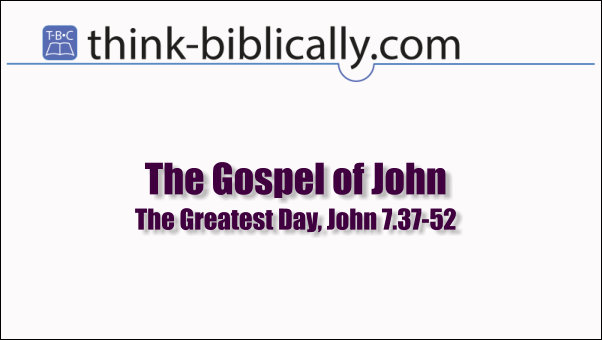By Tyson Thorne

The Feast of Tabernacles is still underway, in fact John identifies it as the both the last day, and the greatest day which presents a problem for modern readers. According to Deuteronomy 16 the feast was 7 days, with a ceremony of water and lights on the seventh day (Mishna, Sukkah 4). This is likely the day that John means, though Leviticus 23.36 mentions an eighth day which was intended as a day of holy assembly. Due to the seventh day having a celebration, and the eighth being described as a solemn assembly, the seventh is more likely to be the "greatest day".
On this greatest day of the feast Jesus was still teaching openly and used one of his favorite metaphors: living water. Jesus is quoting something, but we're not sure what. The phrase "From within him will flow rivers of living water" does not match up well with any Old Testament passage. Suggested passages are Psalm 78.15-15, Isaiah 44.3, 55.1 58.11 and Zechariah 14.8. Go on and look them up. I did, and they are not even close. So what was Jesus quoting from, if not the Old Testament? I don't know. Jesus says he is quoting the Scriptures, which would only be the Old Testament at that time in history. To be sure, I searched other Jewish religious texts and there is nothing like it anywhere. The best explanation for this is that Jesus was summarizing the teachings of several passages together to reveal a conclusion that none of them individually state. It would be as if your pastor said the Scripture says Jesus was both 100 percent man and 100 percent God simultaneously. The teaching is there in the New Testament, though no one passage states that truth that same way.
Those are what we call the textual difficulties with the passage, but what does it mean? Examining verses 37-39 we can deduce that those who believe in Jesus will receive the permanent indwelling of the Holy Spirit following his resurrection. Okay, that may be a little too on the nose. The people in Jesus' audience would not have understood all of that at the time Jesus said it. That said, if they did believe in Jesus, they would come to understand the rest of what he said once the Holy Spirit came upon them.
One point about John's writing: here and in the previous stories John likes to break the story down to three main characters, Jesus, the common people (crowds) and the religious leaders. This passage is no different. After Jesus says these words, some in the crowd are convinced that Jesus is not a rabbi only, but the Prophet they have been waiting for. Other's argued the point from a misunderstanding we covered earlier in the week, wrongly believing that certain details of the Messiah would remain unknown. The crowd was divided.
The scene then changes to the Temple guard reporting these things to the Pharisees. "Why didn't you arrest him and bring him in?" they asked angrily. The guards defended themselves saying, "No one has taught like this before!" For which they were accused of becoming believer's themselves. "We who know the law do not believe in him," they explained. "Only the uneducated masses are fooled by his rhetoric." At this point one of the chief priests speaks up, a familiar face — or at least name — to the reader: Nicodemus. Still staying on the sidelines, he has the courage to appeal to the Law. He is chastised for his efforts, like a referee that makes a bad call, and is asked if he's from Jesus' home town. "Investigate carefully," the Pharisees argue patronizingly, "no prophet comes from Galilee."
With the crowd divided and the religious authorities (mostly) united, John builds the conflict between men and the Messiah.
